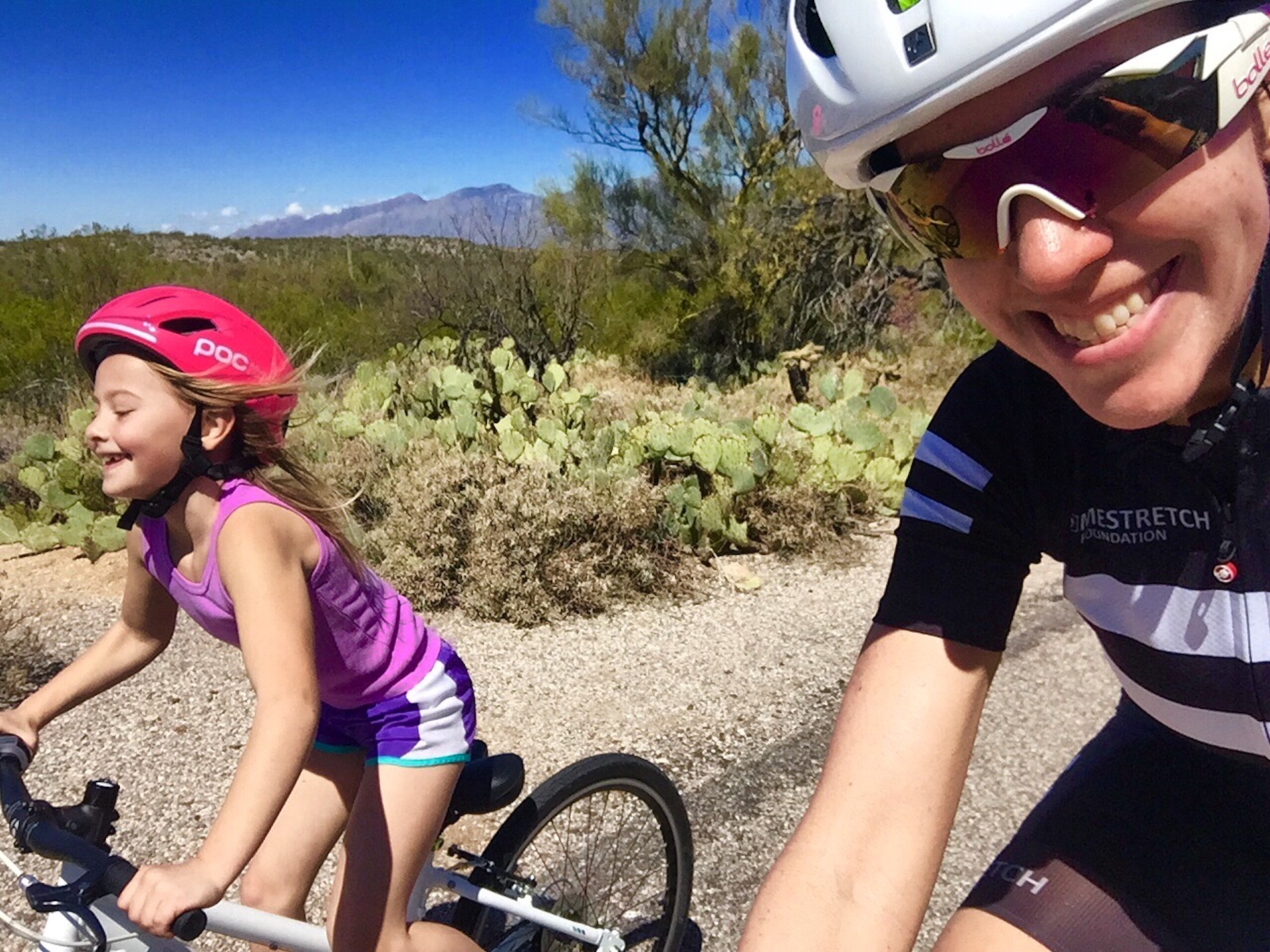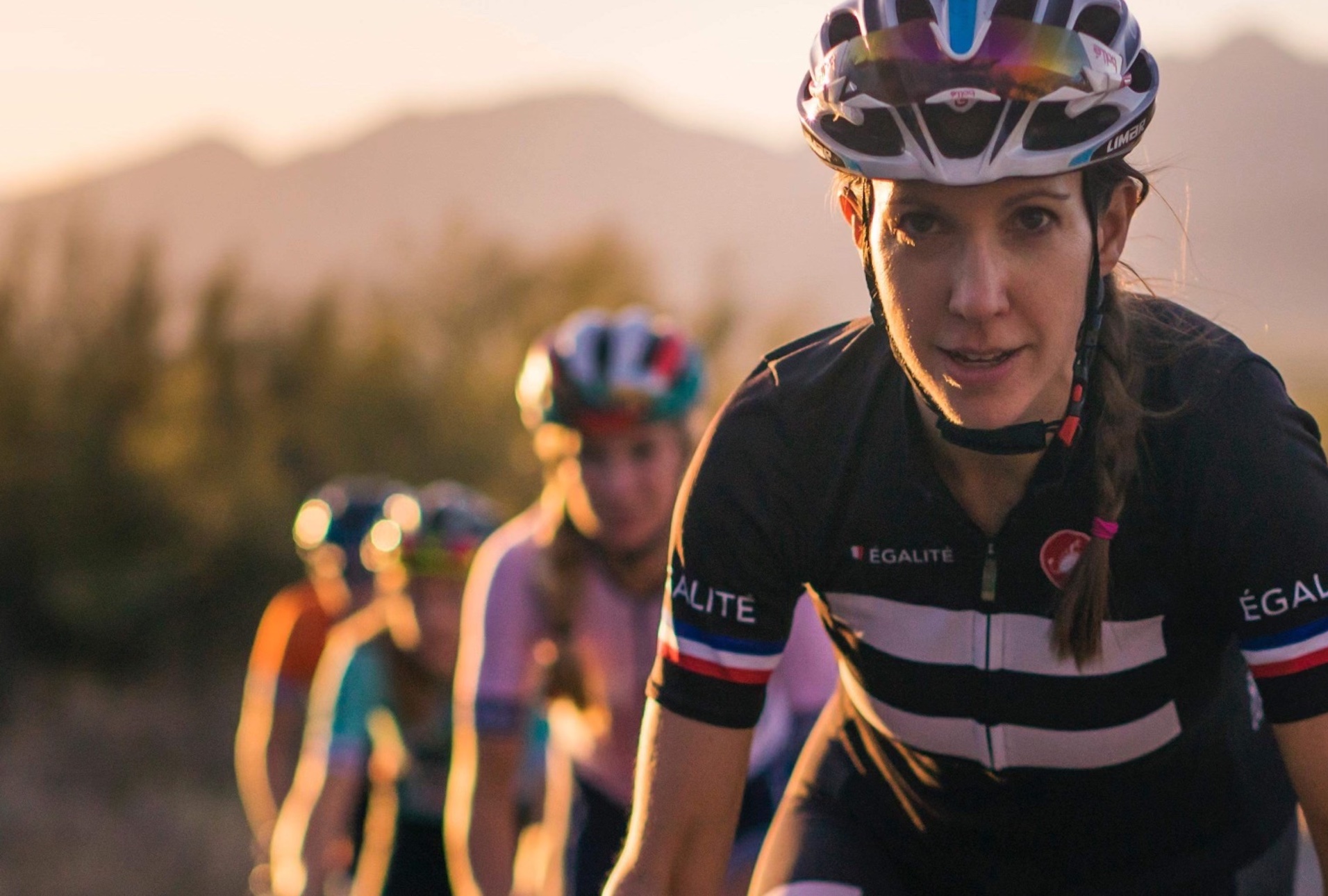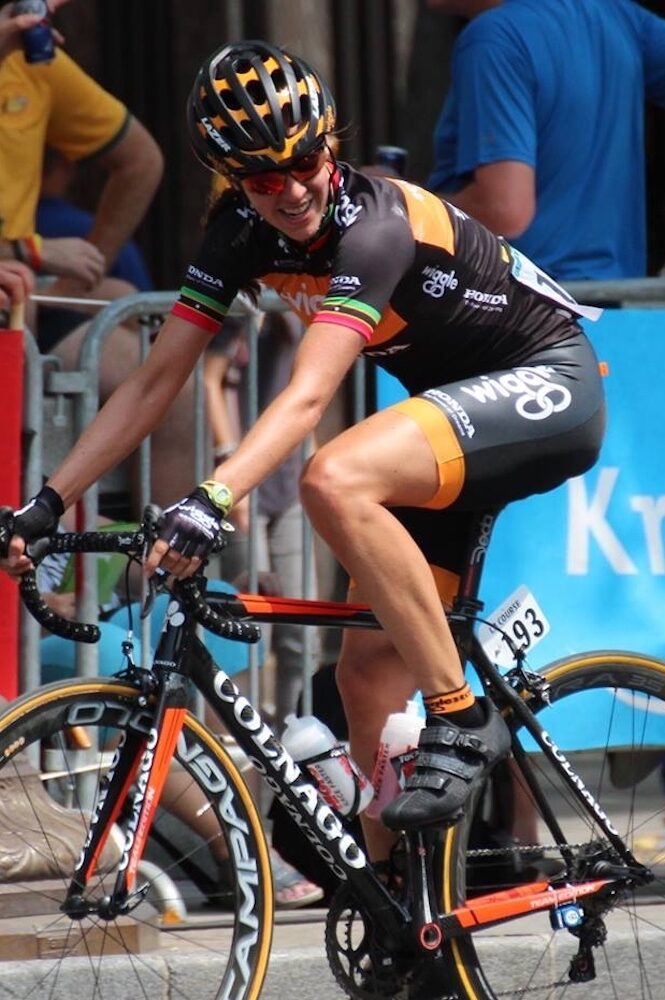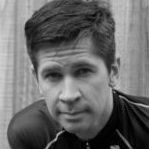by Kathryn Bertine as told to David McQuillen
Kathryn Bertine is an author, athlete, activist, and documentary filmmaker. As a professional cyclist, she raced five years for UCI-registered professional teams [the top level before the 2015 introduction of the women’s WorldTour]. Her documentary film, Half The Road, was named one of the best cycling films of all time by Bicycling magazine. As an advocate for equality in women’s sports, Bertine succeeded in petitioning the Tour de France for women’s inclusion, creating La Course by Tour de France in 2014 which became the Tour de France Femmes avec Zwift in 2022 – a journey she documents in her book, STAND. She is founder and CEO for the Homestretch Foundation, a nonprofit which provides resources like free housing to bridge financial and economic discrepancies for female professional athletes.
Finding Ava, Arizona, 2020
On a warm spring afternoon, I rode my bike through the beautiful eight-mile loop of Saguaro National Park on the east side of my home of Tucson, Arizona. Halfway through, I passed an eight-year-old girl and her dad out for a ride. I told the little girl she was lookin’ strong and awesome, thinking perhaps I’d get a shy smile in return. When she jumped into my draft and bellowed, “You’re not gonna pass me that fast, lady!” my heart exploded into glitter and rainbows and we rode together the rest of the way. That was four years ago, and Ava and I still ride together once a week. She’s an only child and I don’t have kids. We bonded. We’re now bicycle besties/sisters/family. People often say, ”Oh, Kathryn, you’re such a great mentor!” but the truth is Ava mentors me. We laugh, we sing, we stop to climb trees. I didn’t get to do that very often during my pro cycling career. Ava reminds me what really matters: There is nothing better than being outside and riding bikes with people we love.

The Ride I Don’t Remember, Mexico, 2016
I’m told the crash happened about 1.3 miles from the finish line of UCI Vuelta Feminil 2016 in La Paz, Mexico. Seems right; that’s about where my memory cuts out. With the upcoming Rio Olympic Games on the line, May was the final push for UCI qualification points. The race was filled with international contenders, and the speed and tactics were spicy. Heading into the finish, a rider made a move to break away, then changed her mind and swerved back into the peloton. Bodies flew. Apparently mine became the landing mat. My skull fractured twice, seizures ensued, and the doctor in the caravan saved my life. Nos dejando, he said, injecting Ativan. She’s leaving us. (So I’m told.) Thanks to his quick thinking skills followed by three weeks in three hospitals in two countries, I somehow survived this traumatic brain injury. The big awakening, though, was seeing how many people cared. As an activist in women’s cycling, my metaphorical road had been bumpy for a few years, and depression crept in. When word of the crash got around, kindness poured in. While my life hung in the balance of the cracks in my skull, friends and strangers helped heal the cracks in my heart. Who knew falling on your head could be such a blessing? When people ask me about the Big Crash in 2016, I fill with warmth and joy retelling the story. A ride I don’t remember changed my life forever, all of it for the better.
Family On The Loop, Arizona, 2019
It’s impossible to live in Tucson and not fall in love with The Loop, our 54-mile paved bikeway – closed to cars! – which runs along the river paths of our beloved desert city. People are so friendly; cyclists come in all shapes, sizes, genders, ages and ethnicities; walkers and joggers are everywhere; and rules and right-of-way are honored. Everything just works. Riding bikes on The Loop feels like a giant hug of humanity. So when my 83-year-old father needed a safe, flat, sunny place to ride his bike without worry, we took to The Loop frequently. Six miles, 10, 12, whatever Dad felt like doing. When my brother, Pete, came to visit in October 2019 we took him with us on The Loop. He loved it as much as we did, marveling how riding a bike on Brooklyn streets was a little different than Tucson. We stopped to take a photo along the Rillito River Wash: Dad, Pete, and me. None of us knew Dad would be gone seven months later. Four years have passed since my father died, and I ride by this spot on The Loop just about every week. In the beginning, it was tough going past our photo place, and sometimes I burst into tears. But now, my heart loves this section of The Loop. I see Dad there every time. All three of us together, living life to the fullest. Doing nothing special, just pedaling forward as a family on The Loop.
La Course by Tour de France, France, 2014
While most pro cyclists struggle to pick a favorite race, I know immediately and usually interrupt before one finishes asking. Goes something like this:
“What was your favorite r—?”
“La Course by Tour de France!”
“Why?”
“How much time do you have?”
Loaded question. The answer is a 400-page book called STAND: A memoir on activism. A manual for progress. Here is my best attempt in summarizing La Course by Tour de France under 100 words: Once upon a time there was a women’s Tour de France. It went away in 1989. Women were no longer allowed at the greatest bike race in the world. In 2013, we fought to bring it back. We won. In the process I lost everything (tangibles and sanity). I stood on the start line of my dreams on July 27, 2014. I was equal parts broken and whole, and this photo captures it perfectly. Champs Elysees cobblestones, UCI team, strong body, happy face but behind the sunglasses sad tears no one can see. STAND gives the true story of what happens when we dare to stand on the front lines of change. Now 10 years after La Course by Tour de France – which wonderfully morphed into Tour de France Femmes – I have the wisdom and courage to tell people this day was indeed the most meaningful ride of my pro cycling career, and the struggle was worth the journey.


The Hall/Bertine Annual Selfie Ride, Anywhere, Every Year
This ride doesn’t have a specific place or date, but every year for the past 13 years, Lauren Hall and I take a cycling selfie together. Usually Tucson, but sometimes worldwide. Catalina Highway, Mt. Lemmon, The Loop, The Shootout, World Championships, Le Buzz Caffe. What started as a homestay for Lauren, a neo-pro visiting Tucson in 2011, quickly morphed into a lifelong best friendship. I joined the pro ranks a year later in 2012. While Lauren and I never raced on the same team, we were part of the same sisterhood in professional cycling. As a Colorado native, Lauren made Tucson her winter training base. What boggled my mind back then was why the very best female pro cyclists in the world needed a free place to stay? Weren’t their salaries big enough to cover all housing needs? I mean, the men had salaries at the WorldTour level. Why didn’t the women? Long story short: Lauren was the inspiration for Homestretch Foundation. We fought for a base salary at the Women’s WorldTour (and won!). There’s still work to be done for equity in cycling, and it’s easy to get stuck thinking about the struggles and inequities. Which is why joy and laughter is so important to capture and remember. Our annual selfie tradition reminds me what matters most in this sport: friendship, growth and happiness. Thanks, Lauren. Love you.
About Five Rides
We all have rides that we’ll remember forever. A bucket-list climb. A new skill. An incredible performance. A crash. A new friend. An adventure. But which ones truly changed us? Five Rides captures the rides which had a lasting impact on one particular person. Five Rides that really mattered. What are your Five Rides? Comment here or head over to Escape Collective’s Discord to discuss.
What did you think of this story?


